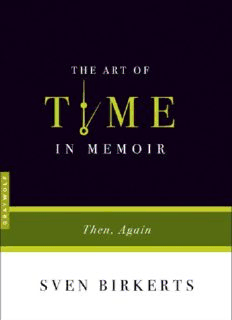
The Art of Time in Memoir: Then, Again PDF
Preview The Art of Time in Memoir: Then, Again
The Art of SERIES EDITED BY CHARLES BAXTER The Art of series is a line of books reinvigorating the practice of craft and criticism. Each book is a brief, witty, and useful exploration of fiction, nonfiction, or poetry by a writer impassioned by a singular craft issue. The Art of volumes provide a series of sustained examinations of key, but sometimes neglected, aspects of creative writing by some of contemporary literature’s finest practitioners. The Art of Subtext: Beyond Plot by Charles Baxter The Art of Time in Memoir: Then, Again by Sven Birkerts The Art of Intimacy: The Space Between by Stacey D’Erasmo The Art of Description: World into Word by Mark Doty The Art of the Poetic Line by James Longenbach The Art of Daring: Risk, Restlessness, Imagination by Carl Phillips The Art of Attention: A Poet’s Eye by Donald Revell The Art of Time in Fiction: As Long As It Takes by Joan Silber The Art of Syntax: Rhythm of Thought, Rhythm of Song by Ellen Bryant Voigt The Art of Recklessness: Poetry as Assertive Force and Contradiction by Dean Young THE ART OF TIME IN MEMOIR THEN, AGAIN Other Books by Sven Birkerts The Other Walk Reading Life: Books for the Ages My Sky Blue Trades: Growing Up Counter in a Contrary Time Readings The Gutenberg Elegies: The Fate of Reading in an Electronic Age American Energies: Essays on Fiction The Electric Life: Essays on Modern Poetry An Artificial Wilderness: Essays on Twentieth-Century Literature EDITOR: Tolstoy’s Dictaphone: Technology and the Muse The Evolving Canon Writing Well, with Donald Hall The Art of TIME IN MEMOIR THEN, AGAIN Sven Birkerts Graywolf Press Copyright © 2008 by Sven Birkerts Publication of this volume is made possible in part by a grant provided by the Minnesota State Arts Board, through an appropriation by the Minnesota State Legislature; a grant from the Wells Fargo Foundation Minnesota; and a grant from the National Endowment for the Arts, which believes that a great nation deserves great art. Significant support has also been provided by the Bush Foundation; Target; the McKnight Foundation; and other generous contributions from foundations, corporations, and individuals. To these organizations and individuals we offer our heartfelt thanks. Clara Ueland and Walt McCarthy are pleased to support the Graywolf Press Art of series in honor of Brenda Ueland. Published by Graywolf Press 250 Third Avenue North, Suite 600 Minneapolis, Minnesota 55401 All rights reserved. www.graywolfpress.org Published in the United States of America ISBN 978-1-55597-489-3 Ebook ISBN 978-1-55597-339-1 4 6 8 9 7 5 Library of Congress Control Number: 2007924774 Series cover design: Scott Sorenson Cover art: Scott Sorenson Life is not what one lived, but what one remembers and how one remembers it in order to recount it. —Gabriel García Márquez Contents The Time of Our Lives Paradises Lost: The Lyrical Seekers Coming-of-Age Fathers and Sons Mothers and Daughters Trauma and Memory Coda Books Cited THE ART OF TIME IN MEMOIR THEN, AGAIN The Time of Our Lives If I had a dollar for every time some writer or student or chance acquaintance has confided to me their desire to write a memoir, I could buy myself a mossy castle in the west of Ireland and disappear once and for all into my private mythology. There’s no getting around it: where we find the sense-making itch—the urge to capture and memorialize personal experience—there we find the scratching of pens. Or, far more likely, the chattering of keys. Memoir is, for better and often for worse, the genre of our times, and I have now read and worked with enough would-be memoirists to recognize the force of the need as well as some of the obstacles to its artistic realization. Again and again people say to me, “If I could just tell it,” and I know exactly what they mean. But how hard it is to disabuse them of the idea that if they just started at the beginning and worked their way forward, all would be revealed. Wrong, wrong, wrong. There is in fact no faster way to smother the core meaning of a life, its elusive threads and connections, than with the heavy blanket of narrated event. Even the juiciest scandals and revelations topple before the drone of, “And then … and then …” Memoir begins not with event but with the intuition of meaning—with the mysterious fact that life can sometimes step free from the chaos of contingency and become story. There is no telling when—or if—the transformation will come, and I am wary about universalizing. What reflections I offer are based on my own experience and necessarily provisional. A curious thing happened to me personally and as a writer—I do make some slight distinction—when I entered my late forties, that time zone I reluctantly acknowledge as marking the onset of middle age. Quite suddenly, at least in retrospect, my relation to my own past changed. How can I describe it? It was as if that past, especially the events and feelings of my younger years, had taken a half step back, had overnight, following no effort on my part, arranged themselves into a perspective.
Description: